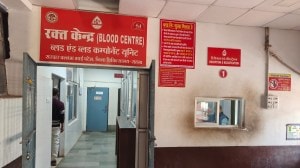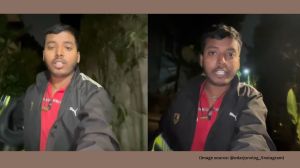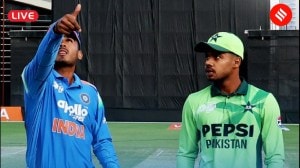Nishikant Dubey’s remarks expunged, then restored: A look at the highs, lows, and details
Restoration 'rare', but Speaker's privilege. In Feb, there was uproar over portions of Rahul, Kharge's speeches being expunged. In another rarity, as PM, Modi's remarks too have been expunged
 Parliamentarians in the Lok Sabha during the Monsoon session of Parliament, in New Delhi, Monday, Aug. 7, 2023. (PTI Photo)(PTI08_07_2023_000182B)
Parliamentarians in the Lok Sabha during the Monsoon session of Parliament, in New Delhi, Monday, Aug. 7, 2023. (PTI Photo)(PTI08_07_2023_000182B) BJP MP Nishikant Dubey’s remarks against the Congress, NewsClick and two journalists alleging they were linked to China “by an umbilical cord”, while speaking in the Lok Sabha on Monday, were expunged from Parliament records but later restored on the House website late evening.
The expunging of words or parts of a speech from Parliament records, as well as their restoration, is entirely the prerogative of the Speaker or Presiding Officer of a House. An expert with knowledge of the parliamentary proceedings told The Indian Express that restoration of remarks once expunged is rare, but underlined: “It is entirely the Speaker’s call as per the House rules.”
Lately, the expunging of Parliament records has consistently run into controversy, with the Opposition alleging partisanship on part of the presiding officers.
In February, large portions of Congress leader Rahul Gandhi’s speech in the Lok Sabha on Prime Minister Narendra Modi and industrialist Gautam Adani were expunged. In all, 18 remarks Gandhi made during his 53-minute speech were removed from the records.
The Congress leader responded by tweeting a video clip of his speech that contained some of the questions he had asked the PM.
A day later, six remarks made by Leader of Opposition in the Rajya Sabha Mallikarjun Kharge on the same issue were expunged from the records of the Upper House. Kharge wrote to Chairman Jagdeep Dhankhar in protest, asserting that any criticism of the government, its policies and their ramifications could never “lower the dignity of the House”.
Noting that the Chair had directed him to authenticate his six observations, Kharge wrote: “… it would be an inversion of the system of governance, if the Opposition members are expected to carry out complete investigation, gather evidence and then raise the matter on the floor of the House. The arrangement, as I understand, is that the Opposition member, or any private member, raises issues on the basis of inputs from media, reports in public domain, or even confidential personal information. The member, after due diligence, draws the attention of the House to such issues and it is incumbent upon the Government to investigate the matter and take appropriate action in consonance with the law of the land”.
In a rare move in February 2020, a word from Modi’s speech in the Rajya Sabha was expunged from official records. Then Rajya Sabha Chairman M Venkaiah Naidu expunged the word used by the PM during his reply to the discussion on a motion thanking the President for his address to the joint sitting of both Houses of Parliament at the start of the Budget Session. Modi had spoken about the Citizenship (Amendment) Act and the planned National Population Register exercise in his speech.
Naidu also expunged a word from then Leader of the Opposition and senior Congress leader Ghulam Nabi Azad’s statement made after Modi had finished his speech.
During Modi’s first term as PM too, Naidu had expunged remarks made by him during his address in the House in August 2018, soon after NDA candidate Harivansh Narayan Singh was elected Rajya Sabha Deputy Chairman, defeating Opposition candidate B K Hariprasad.
Rules on expunging of words from Parliament records
Under Article 105(2) of the Constitution, “no Member of Parliament shall be liable to any proceedings in any court in respect of anything said… in Parliament or any committee thereof”. However, MPs don’t enjoy the freedom to say whatever they want inside the House.
The speech of MPs is subject to the discipline of the Rules of Parliament, “good sense” of its Members, and the control of proceedings by the Speaker. These checks ensure that MPs cannot use “defamatory or indecent or undignified or unparliamentary words” inside the House.
Rule 380 (“Expunction”) of the Rules of Procedure and Conduct of Business in the Lok Sabha says: “If the Speaker is of opinion that words have been used in debate which are defamatory or indecent or unparliamentary or undignified, the Speaker may, while exercising discretion, order that such words be expunged from the proceedings of the House.”
Rule 381 says: “The portion of the proceedings of the House so expunged shall be marked by asterisks and an explanatory footnote shall be inserted in the proceedings as follows: ‘Expunged as ordered by the Chair’.”
“Unparliamentary” expressions
Over the years, a large number of words, both in English and other Indian languages, have been found to be “unparliamentary” by the Presiding Officers — the Speaker of the Lok Sabha and Chairperson of the Rajya Sabha. These unparliamentary expressions are kept out of Parliament’s records.
The Lok Sabha Secretariat has brought out a bulky volume of ‘Unparliamentary Expressions’.This book contains words or expressions that would likely be considered rude or offensive in most cultures. But it also contains content that would appear to be fairly harmless and innocuous.
“At the time (the book was first compiled), references were taken from debates and phrases (that had been) declared unparliamentary by the pre-Independence Central Legislative Assembly, Constituent Assembly of India, the Provisional Parliament, the first to the tenth Lok Sabha and Rajya Sabha, state legislatures, and Commonwealth parliaments like that of the United Kingdom,” former Lok Sabha Secretary General G C Malhotra had told The Indian Express in 2012.
Malhotra was head of the editorial board of the 2004 edition of the book that ran into 900 pages. State legislatures too are guided mainly by the same book of unparliamentary expressions. “Depending upon rulings of the Presiding Officers, new words and phrases continue to be added to the list at regular intervals,” Malhotra had said.
Process to expunge a word or portion of a speech
K Srinivasan, former director, Lok Sabha Secretariat, earlier told The Indian Express: “If a member uses a word that could be unparliamentary or indecent and hurts the decorum or dignity of the House, the head of the reporting section sends it to the Speaker or the Presiding Officer citing relevant rules and precedence with a recommendation to expunge them.”
The Speaker has the discretion under Rule 380 to expunge the word or usage. Once the Speaker expunges the word or usage, it comes back to the reporting section, which removes the word from the records and mentions in the proceedings as “expunged as ordered by the Chair”.
At the end of the Session, a compilation of words removed from the records, along with reasons, is sent to the Speaker’s office, Sansad TV, and the editorial service for information.
The context in which a word or sentence is used is key to making the decision on whether to expunge, Srinivasan said. “We make it a point to remove the minimum number of words,” he said.
Srinivasan gave the example of the word “Godse”, which was expunged first in 1958 after a member equated Prime Minister Jawaharlal Nehru to Nathuram Godse, and then again in 1962 after another member equated Godse to Swami Vivekananda, but was taken off the list of unparliamentary words by Speaker Sumitra Mahajan in 2015.
“It is contextual,” Srinivasan said. “A member cannot praise Nathuram Godse, but he can say Godse assassinated Mahatma Gandhi.”
In November 2019, Godse resurfaced in Parliament, when BJP MP Pragya Singh Thakur made a remark praising him in the Lok Sabha. As the angry Opposition sought an apology from Thakur and BJP members were seen persuading her to sit down, her remarks were expunged from the records.
* What happens after
Expunged portions of the proceedings cease to exist in the records of Parliament, and they can no longer be reported by media houses, even though they may have been heard during the live telecast of the proceedings.
- 01
- 02
- 03
- 04
- 05































